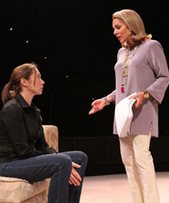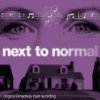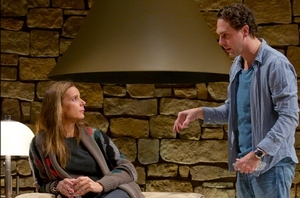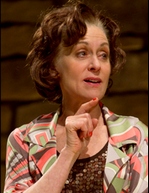SITE GUIDE
SEARCH
REVIEWS
REVIEW ARCHIVES
ADVERTISING AT CURTAINUP
FEATURES
NEWS
Etcetera and
Short Term Listings
LISTINGS
Broadway
Off-Broadway
NYC Restaurants
BOOKS and CDs
OTHER PLACES
Berkshires
London
California
New Jersey
DC
Connecticut
Philadelphia
Elsewhere
QUOTES
TKTS
PLAYWRIGHTS' ALBUMS
LETTERS TO EDITOR
FILM
LINKS
MISCELLANEOUS
Free Updates
Masthead
A CurtainUp Review
Other Desert Cities
By Elyse Sommer
Other Desert Cities Moves to Broadway -- And It's Better Than Ever!
Griffiths's roles in the HBO series Six Feet Under ABC’s Brothers & Sisters, have prepared her to deal with a new set of dysfunctional relatives. Both Griffith and Judith Light, who was for this reviewer, the main reason to see Lombardi, have plumbed new depths in their characters. Except for my comments about the new members of the cast and the plays move from a three-way thrust theater to a proscenium stage, my original comments about the play's strengths apply to the current production. Therefore, rather than repeating myself, I'm reposting my original review below the Booth Theater production notes. I should add that knowing how this family Christmas get-together plays out, in no way made seeing it this time less absorbing. Instead it gave me a chance to appreciate the actors' interaction and Joe Mantello's subtle direction even more. While I can't put my finger on any major rewriting, somehow this time around the finale somehow seemed more moving and thematically powerful than the first time around. I know the season is young, but as of now, this is definitely the best play on Broadway Broadway Production Notes: Other Desert CitiesBy Jon Robin Baitz Directed by Joe Mantello Cast: Stockard Channing (Polly Wyeth), Stacy Keach (Lyman Wyeth), Judith Light (Silda Grauman), (Brooke Wyeth) and Thomas Sadoski (Trip Wyeth). Sets by John Lee Beatty Costumes by David Zinn Lighting by Kenneth Posner Sound by Jill B C DuBoff Music by Justin Ellington Stage manager: James FitzSimmon Running time: 2 hours 15 minutes, including one intermission. Booth Theater 222 West 45th Street 212-239-6200 From 10/12/11; official opening 11/03/11; closing 1/08/120 Tues-Sat @ 8pm; Wed, Sat @ 2pm, Sun @ 3pm Re-reviewed by Elyse Sommer on November 6, 2011 press performance |
My Original Review at Lincoln Center
|
. . .we all live with each other's divergent truths and in spite of having deeply conflicting accounts which don't matter anyway anymore -- because it's in the past. —Trip, the youngest Wyeth, expressing his rage at being caught in the middle of a Christmas reunion which has escalated into a famlial war that has ripped the veneer off smoldering family resentments and secrets.
|

Elizabeth Marvel and Stockard Channing
(Photo: Joan Marcus) |
Thank you too Lincoln Center for supporting Other Desert Cities with a cast and staging that will be the gold standard for the many productions this play is sure to seed (the first one most likely a transfer of this one and with this cast and design team on Broadway). Unlike Wilde's . . . Earnest which begins and ends as a comedy, this welcome new Baitz work gradually shifts into more serious territory.
The catalyst for that move from joyful reunion to painful confrontation is Brooke, the Wyeth's daughter who arrives from her East Coast home. Instead of scarves or ties in her gift boxes, she's packed manuscript copies of her soon to be published book. It might as well be a stick of dynamite since the contents don't just distress her parents but threaten their carefully nurtured retirement to the point of causing an unrepairable rift between Brooke and her parents, as well as between Polly Wyeth and her sister Silda.
That potential family rift also entails a risk of melodramatic excess. Fortunately, Baitz is too skillful a playwright not to pave the way for the highly emotional confrontations to be an organic part of the absorbing whole which — besides the abundance of amusing bon mots, their edge sharpened by the actors' deft delivery — addresses a number of thought and discussion provoking issues: the clouds lurking behind the sunny image of places like California. . . the way political differences can exacerbate family tensions that, even in families harboring less potentially explosive secrets and lies, have a way of rising to the surface during holiday reunions . . . the consequences to be considered by writers whose memoirs are not just about them but other people. It all adds up to a quadruple genre merger of drawing room comedy, family drama, political/social satire, and mystery (the story of the Wyeth's dead oldest offspring and Brooke's beloved brother and best friend Henry who was part in the counter-culture and violent anti Vietnam scene).
The play's time frame is a morning, late afternoon and evening of Christmas Eve 2004. The drawing room comedy part of the play begins with the visiting Brooke (Elizabeth Marvel) and Trip (Thomas Sadoski) joining their parents in the living room after a tennis game. The playwright's savvy dramaturgy establishes the characters, their personalities and relationship dynamics almost instantly. Their conversation is sharp, instantly character defining and believable (even though most real life family interchanges tend to be more mundane and not as witty).
Within minutes we know that Brooke's living in New York is a rejection of not just the sameness of California's weather but everything it represents. We realize too that her dad, Lyman (Stacy Keach), worries about her, especially since she's recovering from a nervous breakdown as well as the 9/11 disaster. Brother Trip's comment about a house next door that their parents would probably buy for them to have them near by reinforces dad's protectiveness. Mother Polly's (Stockard Channing) not-a-hair out of place elegance locates us in the home of a pair of wealthy rock-rib Republicans.
Unlike Lyman, Polly views her daughter's East Coast life more critically than protectively. "(I think living on the east coast has given you the impression that sarcasm is alluring and charming. It is not. Sarcasm is the purview of teenagers and homsexuals"). Neither does it take more than a quick zinger from Brooke to clarify that this is a Wasp-Jewish mixed marriage. (Polly's announcement that Christmas dinner will be at the country club has Trip wondering about what kind of people have Christmas at a country club sarcastically answered by Brooke's "God made country clubs so half-goy hipsters and their aging parents don't have to cook").
The first scene continues to be strewn with hints about hidden secrets and lies waiting to be unpacked. The bombshell book is discussed, the talk about Trip's less artistic career as a TV reality show producer helps to set him up as the one most comfortable in the current cultural climate. The inevitable move into darker territory via the story of the missing Henry comes with Brooke's correcting Pollys reference to her two children with a fraught "Three. "
What's clear throughout is that the actors exchanging all this smart talk are perfection. They make their characters interesting and real individually and in relation to each others
The pivotal conflict is between the mother and daughter but though Channing and Marvel are both unfailingly stellar performers, this is very much a 5-star cast. The last to come on scene family member, Linda Lavin as Polly's alcoholic sister and long-ago writing partner in a successful chicklit type movie series, may seem to be, but isn't really, a minor character added mostly for extra comic relief. Lavin does indeed get to display her well-known talent for nailing one-liners, starting with her entrance line about awakening from a night filled with bad dreams ("I have more Nazi dreams than Eli Wiesel"). However, even witticisms like her definition of Palm Springs as less a refuge than "King Tut's tomb" and "filled with mummies with tans." Ultmately, she contributes a far from minor plot element to the dicey situation of her niece's book and the Henry mystery.
Thomas Sadoski, like Lavin, at first seems a less critical participant in the debate about the memoir Brooke feels she must publish and her parents see as testing their parental love and support to unbearable limits. However, especially at the beginning of the second act, Sadoski reveals new depths in Trip, and show him to be the one member of this family who can view himself and his family's strained and yet unbreakable bonds with a clear eye.
Stacy Keach as the still handsome former actor who followed his friend Ronald Reagan into politics, and who now wants family peace at any price may have the fewest laugh lines but he gets the most heart-wrenching scene. That's when he finally reveals the secret he and Polly have lived with for years.
Joe Mantello, who directed two of Mr. Baitz's earlier plays, Mizlansky/Zelinsky or "Schmucks" and Three Hotels, sees to it that the transition from light-hearted banter to heavy duty drama is fluidly paced and that even when the spotlight is on one actor attention must also be paid to the others on stage. This is notably exemplified by Keach's above mentioned big scene which is a master class in non-verbal acting—, with even a fast asleep Linda Lavin very much on.
Though it's good to have a season with a terrific revival of Wilde's ever amusing . . . Earnest and a new work by one of our ablest modern playwrights, it's disheartening that only the much tested revival was considered enough of sure-fire ticket seller to open up on Broadway. I wish Mr. Baitz had not felt that his work would fare better in the less high pressure setting of a small prestigious Off-Broadway theater like the Mitzi Newhouse and that the folks at Lincoln Center had persuaded him (and themselves) to open Other Desert Cities instead of Women on the Verge of a Nervous Breakdown on Broadway. But never mind. Even if the play now probably has to wait until next year to find an available Broadway home, what matters is that Mr. Baitz has created a family portrait of characters who are neither heroes or villains —just real, fallible and, above all, very human.
John Robin Baitz plays reviewed at Curtainup
Chinese Friends Playwrights Horizon 2004
The Paris Letter 2005 Roundabout
Ten Unknowns2001 Lincoln Center
Hedda GablerBaitz adaptation 2001
Mizlansky/Zelinsky or "Schmucks"/ 1999 Manhattan Theater Club
The Film Society(1997 Williamstown)
End of the Day 1996 Williamstown
|
Other Desert Cities By Jon Robin Baitz Directed by Joe Mantello Cast: Stockard Channing (Polly Wyeth), Stacy Keach (Lyman Wyeth), Linda Lavin (Silda Grauman), Elizabeth Marvel (Brooke Wyeth) and Thomas Sadoski (Trip Wyeth). Sets by John Lee Beatty Costumes by David Zinn Lighting by Kenneth Posner Sound by Jill B C DuBoff Music by Justin Ellington Stage manager, James FitzSimmons Running time: 2 hours 15 minutes, including one intermission. Lincoln Center's Mitzi E. Newhouse Theater (212) 239-6200; lct.org. From 12/29/10; opening 1/13/11; closing 2/26/11. Reviewed by Elyse Sommer at January 19th press performance |
|
REVIEW FEEDBACK Highlight one of the responses below and click "copy" or"CTRL+C"
Paste the highlighted text into the subject line (CTRL+ V): Feel free to add detailed comments in the body of the email. . .also the names and emails of any friends to whom you'd like us to forward a copy of this review. Visit Curtainup's Blog Annex For a feed to reviews and features as they are posted add http://curtainupnewlinks.blogspot.com to your reader Curtainup at Facebook . . . Curtainup at Twitter Subscribe to our FREE email updates: E-mail: esommer@curtainup.comesommer@curtainup.com put SUBSCRIBE CURTAINUP EMAIL UPDATE in the subject line and your full name and email address in the body of the message. If you can spare a minute, tell us how you came to CurtainUp and from what part of the country. |

Slings & Arrows-the complete set
You don't have to be a Shakespeare aficionado to love all 21 episodes of this hilarious and moving Canadian TV series about a fictional Shakespeare Company








